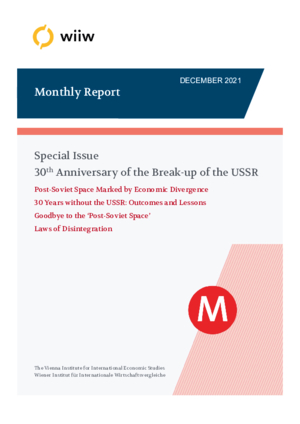Monthly Report No. 12/2021
Vasily Astrov, Ruslan Grinberg, Vladislav L. Inozemtsev and Artem Kochnev
wiiw Monthly Report No. 12, December 2021
47 pages including 23 Figures
Special Issue
30th Anniversary of the Break-up of the USSR
- Chart of the month: Post-Soviet space marked by economic divergence
by Vasily Astrov
- 30 years without the USSR: outcomes and lessons
by Ruslan Grinberg
The demise of the Soviet Union 30 years ago was very abrupt and largely unexpected, even by those who set it in motion. The economic consequences of its collapse as well as those of fully embracing free market ideology without preserving the benefits of the former system proved catastrophic. The current anti-democratic and anti-western backlash in Russia is arguably the result of these policy missteps and could have been avoided, had different policies been pursued at the time.
- Goodbye to the ‘post-Soviet space’
by Vladislav L. Inozemtsev
Thirty years after the break-up of the USSR, the term ‘post-Soviet space’ is no longer appropriate. On the one hand, there has been a sharp economic divergence between the post-Soviet republics, with the southern ‘periphery’ performing much better than the western regions. On the other hand, Russia’s foreign policy has focused increasingly on Belarus and Ukraine, opening up opportunities in Central Asia for other global players.
- Laws of disintegration
by Artem Kochnev
When it comes to analysis of the Soviet legacy in Europe, one can hardly avoid discussions about unrecognised states. This piece contributes to the discussion by analysing the constitutional design of the late Soviet Union. It argues that the origins of the breakaway republics were rooted in a contradictory institutional design, which provided political leaders with both the legitimacy and the legal grounds to exploit a nationalist agenda amid rising political activism.
- Monthly and quarterly statistics for Central, East and Southeast Europe
Reference to wiiw databases: wiiw Annual Database, wiiw Monthly Database, wiiw FDI Database
Keywords: catching-up, economic divergence, Belovezh Agreement, free market reforms, particularistic chauvinism, southern periphery, western periphery, Russia’s foreign policy, post-Soviet geopolitics, breakaway republics, constitutional design, self-determination, armed conflicts
Countries covered: Former Soviet republics
Research Areas: Macroeconomic Analysis and Policy
